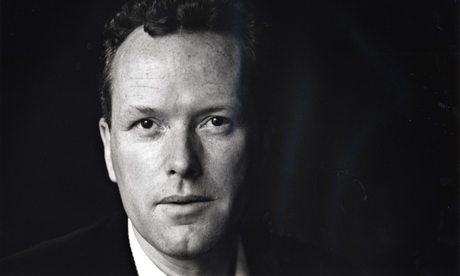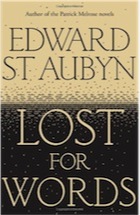It got a thumbs down from reviewers, but the Wodehouse comic fiction prize was right to recognise this delicious jeu d'esprit

Letting off steam … Lost for Words marks a departure after St Aubyn's autobiographical Melrose novels. Photograph: Jane Bown
Edward St Aubyn's satirical novel Lost for Words, which depicts the fools and frauds who judge a prestigious literary prize and the charlatans who compete for it, has just won a prestigious literary prize. This year's Wodehouse prize for comic fiction has gone to a novel that had received a general thumbs down from reviewers (including in this newspaper). Do the judges know something the critics don't?
Well, yes. The many characters in this short book are all superficially drawn, but the narrative does delicious justice to each one's particular follies. St Aubyn's usual method in his novels is to move disconcertingly between the points of view of his characters, including the idiots and the monsters. In Lost for Words each short chapter is a capsule for one person's habits of thought, pursued with elegant ruthlessness by the author. The author has spoken of writing speedily, abandoning his usual practice of endless revision. Plot and structure matter little, but any page has something delicious.
 As well as the novelists (and the relishable parodies of their outputs) there are their literary attendants. My favourite is Didier, the libidinous French cultural theorist, who is peddling his latest rumination, Qu'est-ce la Banalité?, while committing himself wholeheartedly to "a late-capitalist utopia of obligatory permissiveness". As ever in St Aubyn's fiction, the stylistic texture is literary, but allusion is comically distorted by the inclinations of his characters
As well as the novelists (and the relishable parodies of their outputs) there are their literary attendants. My favourite is Didier, the libidinous French cultural theorist, who is peddling his latest rumination, Qu'est-ce la Banalité?, while committing himself wholeheartedly to "a late-capitalist utopia of obligatory permissiveness". As ever in St Aubyn's fiction, the stylistic texture is literary, but allusion is comically distorted by the inclinations of his characters
Sonorous lines from St Paul get jumbled in the head of prize committee chairman and arch-cynic Malcolm Craig MP; a sardonic Henry James quote pops unbidden into the head of the failed adulterer and hopeless publisher Alan Oaks as he contemplates crawling back to his angry wife. St Aubyn makes beautiful sentences out of his characters' lowest inclinations.
Lost for Words is self-evidently a jeu d'esprit – not so much revenge against Man Booker judges of the recent past but a release of energy after the completion of his five-part autobiographical Melrose sequence. It's written with pleasure, and there's plenty of pleasure here for nimble readers. It has taken a literary prize to advertise the fact
 As well as the novelists (and the relishable parodies of their outputs) there are their literary attendants. My favourite is Didier, the libidinous French cultural theorist, who is peddling his latest rumination, Qu'est-ce la Banalité?, while committing himself wholeheartedly to "a late-capitalist utopia of obligatory permissiveness". As ever in St Aubyn's fiction, the stylistic texture is literary, but allusion is comically distorted by the inclinations of his characters
As well as the novelists (and the relishable parodies of their outputs) there are their literary attendants. My favourite is Didier, the libidinous French cultural theorist, who is peddling his latest rumination, Qu'est-ce la Banalité?, while committing himself wholeheartedly to "a late-capitalist utopia of obligatory permissiveness". As ever in St Aubyn's fiction, the stylistic texture is literary, but allusion is comically distorted by the inclinations of his charactersSonorous lines from St Paul get jumbled in the head of prize committee chairman and arch-cynic Malcolm Craig MP; a sardonic Henry James quote pops unbidden into the head of the failed adulterer and hopeless publisher Alan Oaks as he contemplates crawling back to his angry wife. St Aubyn makes beautiful sentences out of his characters' lowest inclinations.
Lost for Words is self-evidently a jeu d'esprit – not so much revenge against Man Booker judges of the recent past but a release of energy after the completion of his five-part autobiographical Melrose sequence. It's written with pleasure, and there's plenty of pleasure here for nimble readers. It has taken a literary prize to advertise the fact
Where in Auckland can I get this book?
ReplyDeleteI would try Unity Books in High Street
ReplyDelete